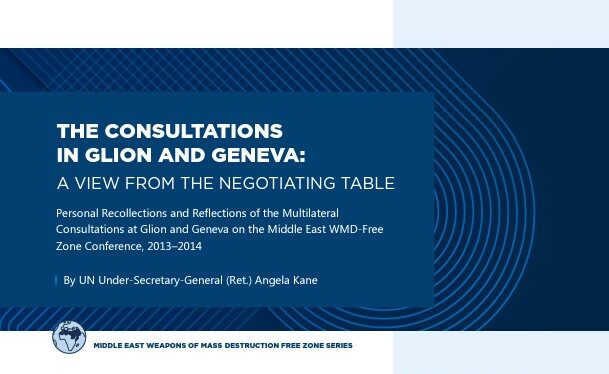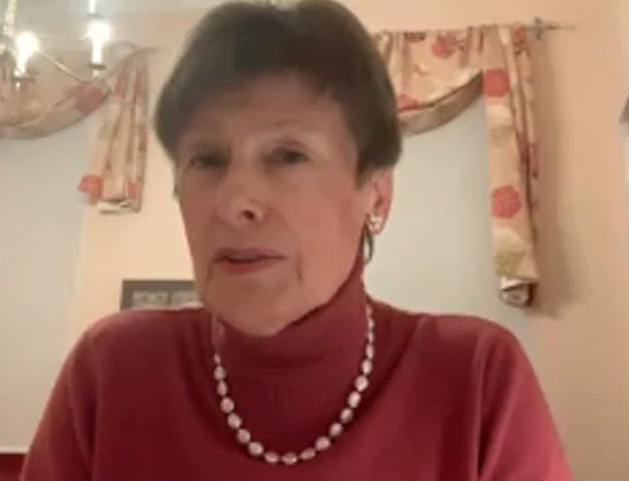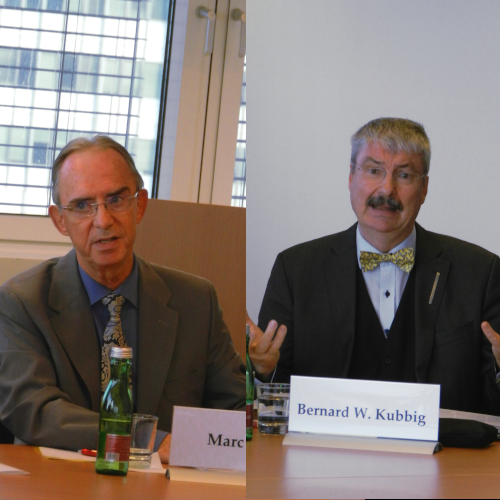
On 18 October 2018, the VCDNP hosted a joint seminar with the Geneva Centre for Security Policy (GCSP) and the Academic Peace Orchestra Middle East (APOME) that addressed the complex set of issues related to the conclusion of a zone free of weapons of mass destruction (WMD) in the Middle East. At the seminar, Mr. Marc Finaud, GCSP Arms Proliferation Cluster Leader and Dr. Bernard W. Kubbig, APOME Coordinator, discussed their thoughts on what could be done to make progress on such a zone.
The conclusion of a WMD Free Zone (WMDFZ) in the Middle East was mandated in the final document of the 1995 Review Conference (RevCon) of the Treaty on the Non-Proliferation of Nuclear Weapons (NPT). More than 20 years later, the zone still has not been established. The 2020 NPT Review Conference, which also marks the 50th anniversary of the Treaty, could be in jeopardy if the States Parties do not find a constructive solution on a zonal arrangement in the Middle East. Based on their Policy Forum series of publications, Mr. Finaud and Dr. Kubbig offered compromise-minded proposals to break the stalemate in this debate.
Their “Cooperative Ideas” come at a time when, as was later stressed during the Q&A session, the First Committee of the United Nations General Assembly (UNGA) recently took action on a draft resolution on “Convening a Conference on the Establishment of a Middle East Zone Free of Nuclear Weapons and other Weapons of Mass Destruction in the Middle East”. If adopted, the UNGA would entrust the Secretary-General with convening no later than June 2019 a conference on establishing such a zone, to which will be invited all States of the Middle East, the three co-sponsors of the resolution on the Middle East adopted by the 1995 NPT RevCon (Russia, the US and the UK), the other two nuclear-weapon States (China and France) and the relevant international organizations, such as the IAEA and OPCW.
The draft resolution would have the conference take as its terms of reference the 1995 NPT resolution, and all decisions emanating from the conference would be taken by consensus by the States of the region. According to the speakers, the resolution aims at taking the controversial WMD issue out of the NPT framework in order to save the NPT Process and the NPT RevCon. In their view, the negative implication is that this approach is a farewell to all earlier attempts between the Helsinki mandate of the NPT community taken in 2010 and the failure of the NPT RevCon in 2015. These efforts included the Glion/Geneva process between October 2013 and June 2014 when all vital parties of the region sat together for the first time in 19 years to discuss the WMD-free zone issue in an informal way. In terms of substance the basic gap between “Disarmament First!” and “Regional Security First!” which was the crucial controversial issue in the Glion/Geneva talks that could not be solved would be left out or circumvented in the draft resolution.
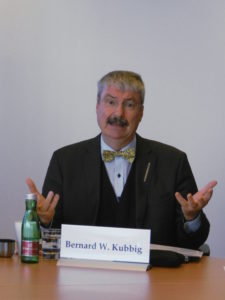
Dr. Kubbig addressed what is at stake in the lead up to the 2020 NPT Review Conference. In his view, the failure to reach final consensus recommendations during the 2015 NPT Review Conference stemmed from a lack of understanding about the broader security context in the Middle East. “Security is more than the weapons,” said Dr. Kubbig. “The weapons are part of the broader regional context, so you cannot isolate them. You have to take individual concerns of States in the region into account.” He stressed further that a comprehensive notion of security would include dialogue structures which allow the actors to express their interests and concerns. “The challenge is,” Dr. Kubbig emphasized, “to provide incentives for the only nuclear weapon State in the region to engage in a productive dialogue.”
In view of this asymmetrical situation in the nuclear field, the idea of the Policy Forum series is to find compromises, quid-pro-quo approaches and other solutions that address the concerns of all States Parties without sacrificing the broader goal of a WMDFZ in the Middle East. Mr. Finaud pointed out that this issue had been on the table for decades and that not much had changed despite ongoing proposals. He stressed that it was not productive to “engage in the same behavior over and over again and expect a different result. We have to think of new ways to bypass these blockages.”
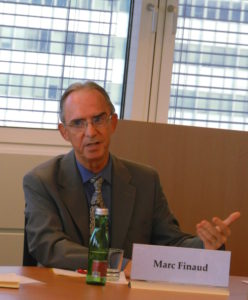
Mr. Finaud noted that States interested in the conclusion of a WMDFZ in the Middle East should not be afraid to seek the so-called “low-hanging fruit.” By taking some small steps towards the conclusion of such a zone, States in the region might be more amendable to reaching a broader solution on the zone itself. Some of those steps, said Mr. Finaud, could include the appointment of a United Nations special representative to manage negotiations, which would provide a forum and independent space for interested States to discuss their concerns. Another approach could include the establishment of an expert group on verifying compliance in the zone or the opening of a regional security center. Such steps would increase confidence and trust among States in the region.
Other ideas that the speakers presented during the seminar included:
Emphasizing the specific role of non-governmental experts, the presenters expressed hope that the stalemate in regional non-proliferation and disarmament could be overcome by learning from the quite promising discourse among experts dealing with nuclear security and safety – with the threats from nuclear, biological, chemical and radiological weapons working as a unifier for the splintered actors in the region. The speakers emphasized that this was not an exhaustive list of all cooperative ideas that the Policy Forum series proposes.
Much of the remainder of the session was spent discussing additional approaches towards achieving progress on the zone. Topics included the signature and ratification of the CTBT as a vital confidence-building measure and the creation of forums for all Middle Eastern countries to express their security concerns as a way to start to increase interest in the region in seriously negotiating a WMDFZ. If, as the presenters posited, weapons are part of the broader regional picture, the reduction of tensions in the Middle East and the generation of political will be regarded as necessary steps toward a successful 2020 NPT Review Conference. The lively discussion underscored that a lot of analysis still needed to be done, including on a possible productive role for Europe in advancing the discussion on a WMD-free zone in the Middle East.
